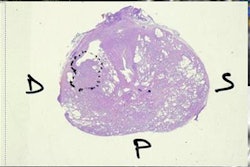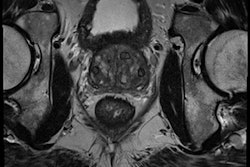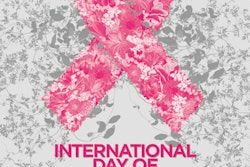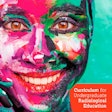The U.K. Royal College of Radiologists (RCR) said the results of the Prostate MR Imaging Study (PROMIS), published last Thursday in the Lancet, will "lead to a paradigm shift in the way men with suspected prostate cancer are investigated."
PROMIS set out to determine if multiparametric prostate MRI (MP-MRI) before prostate biopsy could safely exclude significant prostate cancer and avoid the need for biopsy. The study also aimed to find out how accurate prostate biopsy was compared with MRI. It included 561 men who had multiparametric prostate MRI followed by template prostate mapping biopsies then transrectal ultrasound-guided (TRUS) biopsies.
The researchers found that MP-MRI is almost twice as sensitive as TRUS biopsy at detecting cancer and has a negative predictive value of 89%. They also concluded that MP-MRI could be used as a triage tool to help decide which men should have a TRUS biopsy, possibly reducing the number of men needing biopsy by 25%.
"Clearly, we need to change the diagnostic pathway to include MP-MRI prior to considering biopsy," the RCR said in a statement. "To do this, we will need more radiologists, more scanners capable of performing these high-quality scans, and specialist training of radiologists so that they can interpret them. This will greatly improve prostate cancer diagnosis, [and] avoid unnecessary biopsy and overtreatment of tens of thousands of men each year."
Men suspected of having prostate cancer -- indicated by a raised prostate-specific antigen (PSA) level or abnormal digital rectal exam -- would previously have TRUS biopsies prior to an MRI examination. If the biopsies were positive, a staging MRI exam would be performed, according to the RCR. If the biopsies were negative, further biopsies or an MRI would be performed.
The problem with this method is that a raised PSA level is not specific for cancer, and ultrasound-guided biopsy may miss a significant tumor or biopsy an area of insignificant tumor that could lead to overtreatment and unnecessary worry, the RCR noted.



















